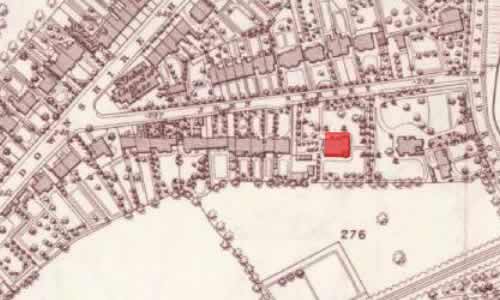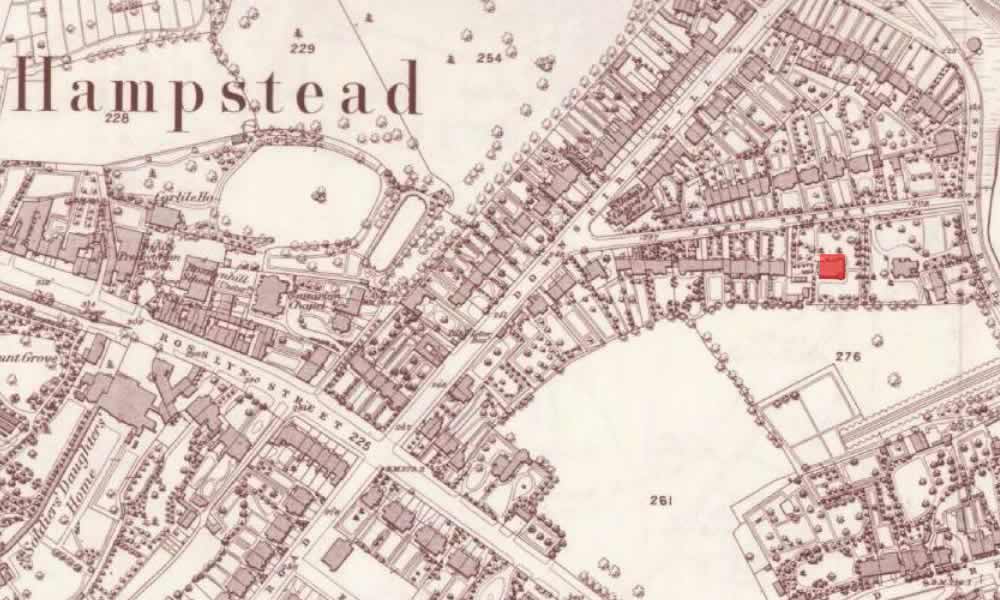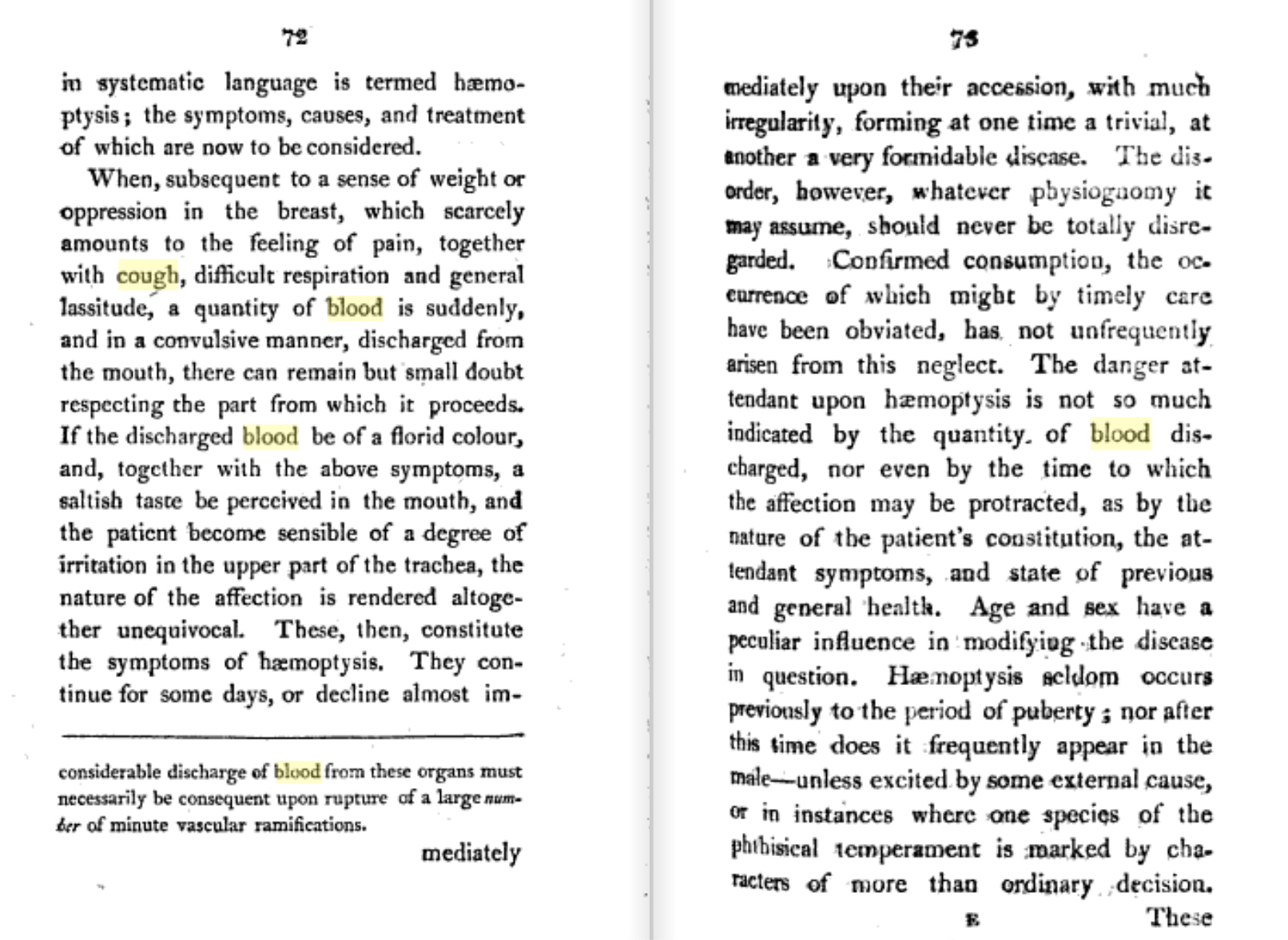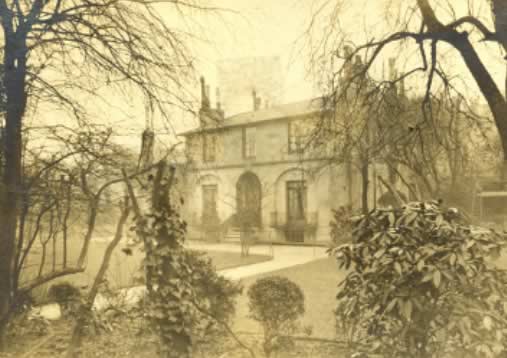3 February 1820: Consumption: That Drop of Blood
; I Wish I had a little
Hope
Wentworth Place, Hampstead


Late evening, 3 February 1820. Freezing weather has gripped England. After travelling in an open carriage from London to Hampstead with the bitter wind coming at him (and without his new heavy coat), Keats arrives home both chilled and fevered. Upon immediately getting into bed, Keats coughs a little blood onto his pillow. He asks for candle light. His very close friend and roommate at Wentworth Place, Charles Brown, recalls what Keats says, though some of Keats’s actual wording might be slightly magnified by Brown:
I know the colour of that blood;—it is arterial blood;—I cannot be deceived by that
colour;—that drop of blood is my death-warrant;—I must die.
Brown runs for surgeon, who decides to bleed Keats. He’s then placed on a starvation diet and told to rest. This is not good.
Keats, with his medical training—and from seeing his younger brother, Tom, through the illness of consumption until Tom’s death in
late 1818—recognizes from the colour of the blood (being oxygenated, and therefore
a brighter
red) that it comes from the lungs, and not, for example, from his throat, which would
be of a
darker colour (known as venous blood). Keats had also witnessed his mother die from
consumption. In short, Keats knew something about his condition. Keats, then, recognizes
that
the coughed-up blood does indeed likely signal consumption, the slow, nasty illness
also
sometimes referred to as the white plague or white death (the disease also gained
the mantle
of the robber of youth
), but what we know as tuberculosis—TB. No one yet knew with any
certainty that it was an infectious, airborne disease. Many thought it was inherited,
or that
it was something like cancer. About one out of four/five deaths in Keats’s time was
caused by
consumption (with an even higher rate in London at the time), and it is almost certainly
the
most deadly pathogen in human history.


Keats disagrees with a shortly-following diagnosis by a doctor that his lungs are
clear. He
will receive the same and obviously incorrect assessment later in the month, with
one
diagnosis suggesting that Keats’s illness might be psychosomatic. A week or so later
after his
hemorrhage, Keats describes that night, when so violent a rush of blood came to my Lungs
that I felt nearly suffocated
(?10 Feb, to Fanny
Brawne). To his younger sister, Fanny, he
writes about his carelessness in being caught out in cold: From impudently leaving off my
great coat [which in late December a doctor advises him to buy] in the thaw I caught
cold
which flew to my Lungs
(6 Feb). Keats has for some time feared the bad weather, and a
chronic sore throat and occasional fevers have plagued him for more than a year and
a half,
and may have been lingering signs of the illness—it can infect and then linger (wax
and wane)
for up to a few years before it fully shows itself. There is a reasonable chance that
his
chronic sore throat involved TB in his larynx.*
And to Fanny Brawne, his betrothed, who lives
next door in the other half of Wentworth Place—quite literally, on the other side
of the wall,
where he could not just imagine her presence but constantly hear it and on occasion
see her—he
writes a note the day after the hemorrhage: They say I must remain confined to this room
for some time. The consciousness that you love me will make a pleasant prison of the
house
next to yours.
But being next door to Fanny also grows to have
the opposite effect: anxieties, uncertainties, and fears will come to conflate with
love,
passion, and guilt—guilt for confining her because of his condition, and then putting
upon her
his dark fate. Keats refers to his nervousness, anxiety, and depressed state of mind
throughout the month. He suggests to Fanny that they break off their engagement.
Illness,
he writes, stands as a barrier betwixt me and you!

With the presence of Fanny and the possibility
of death before him—and with his brother George
now once more recently departed for America; with Tom having passed away just over
a year ago
dying from the same illness he likely has; with his finances dire; with his younger
sister
sometimes sequestered from him by the family guardian; with public indifference to
his poetry;
with tiring of some of his friends despite their acknowledged kindnesses; and with
having
loved the principle of beauty in all things,
anxious
thoughts understandably press upon him in the middle of the night: he fears he
has left no immortal work behind me,
he writes in a note to Fanny Brawne. How wrong he is.
Poetry, then, is not part of this month, and neither is much hope, even if he does
think of
completing his comic fairy poem, The Cap and Bells; Or, The
Jealousies, at some future date (he doesn’t). In a note to Fanny Brawne written during February, he says, I am recommended
not even to read poetry much less write it. I wish I had a little hope.
Keats muses upon
how he has, for the last six months or so, lost his feeling for natural beauty, but
now he
affectionately thinks about the beauties of Nature
—on every flower I have known from
my infancy
—while he watches the comings-and-goings outside his parlour window (letters,
14 Feb). Some of this is slightly overstated, since at least in Winchester in August
and
September he is greatly touched and inspired by Autumn’s warm, even chaste,
beauties
(letters, 21 Sept). But that must seem like years ago, given his condition and circumstances.
By the end of month, Keats reports feeling somewhat better; but this is only a brief reprieve from the horrible disease, one that takes its time, that comes and goes, as it wastes away—consumes—its victims. So as the illness steadily progresses, Keats’s own poetic progress ends; his reputation as an exceptional poet, however, is just beginning, and unlike the characteristic feature of his illness, it will not, over time, waste away.
_____________
*My sincere thanks to Dr. Marc Lipman for his consultation about the symptoms and
onset of
tuberculosis and Keats’s account of it. Dr Lipman: Certainly the natural history of
untreated TB was one of waxing and waning for many people—and this could be for years.
Hence
it may be that Keats had TB involving his larynx, which gave him the sore throats,
as well
some disease in his lungs (the chest infections). What then probably happened, when
he found
(bright red) blood on his pillow, was that his TB had progressed to develop cavities
in the
lungs, and one of these had eroded into a blood vessel that was being supplied by
arterial
blood, which is a brighter red than venous blood as it contains more oxygen, and at
a higher
pressure than the rest of the blood vessels in the lung. As a medical trainee, he
recognised
this—and its significance: namely that the bleeding was likely to be of much greater
consequence if it continued. Hence his comment that he was done for. This also fits
with the
findings of extensive disease reported following his autopsy (where, incidentally,
his lungs
would have been very infectious to others).
Marc Lipman is Professor of Medicine at University College London and Consultant in
Respiratory & HIV Medicine and Royal Free London NHS Foundation Trust. He is Director
of
UCL-TB, UCL’s cross-disciplinary TB research grouping.

